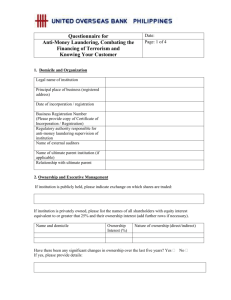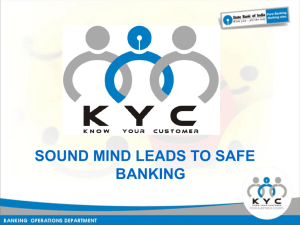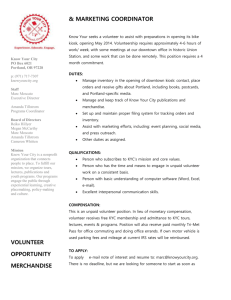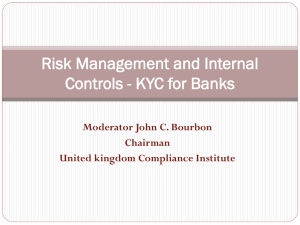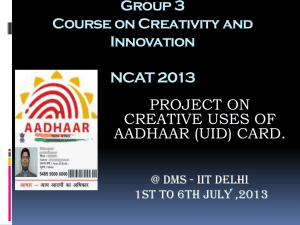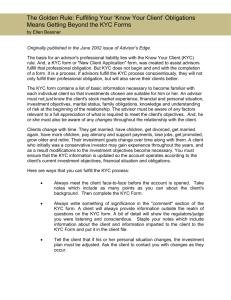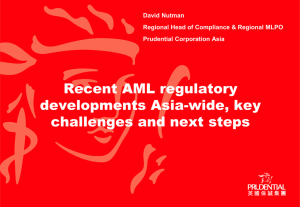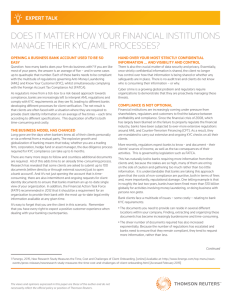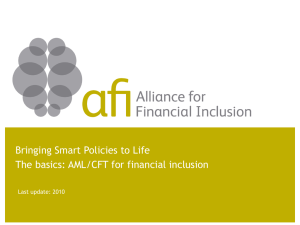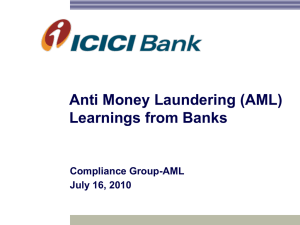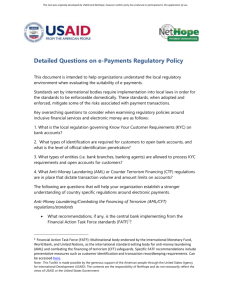Know Your Customer Policy and Anti-Money
advertisement
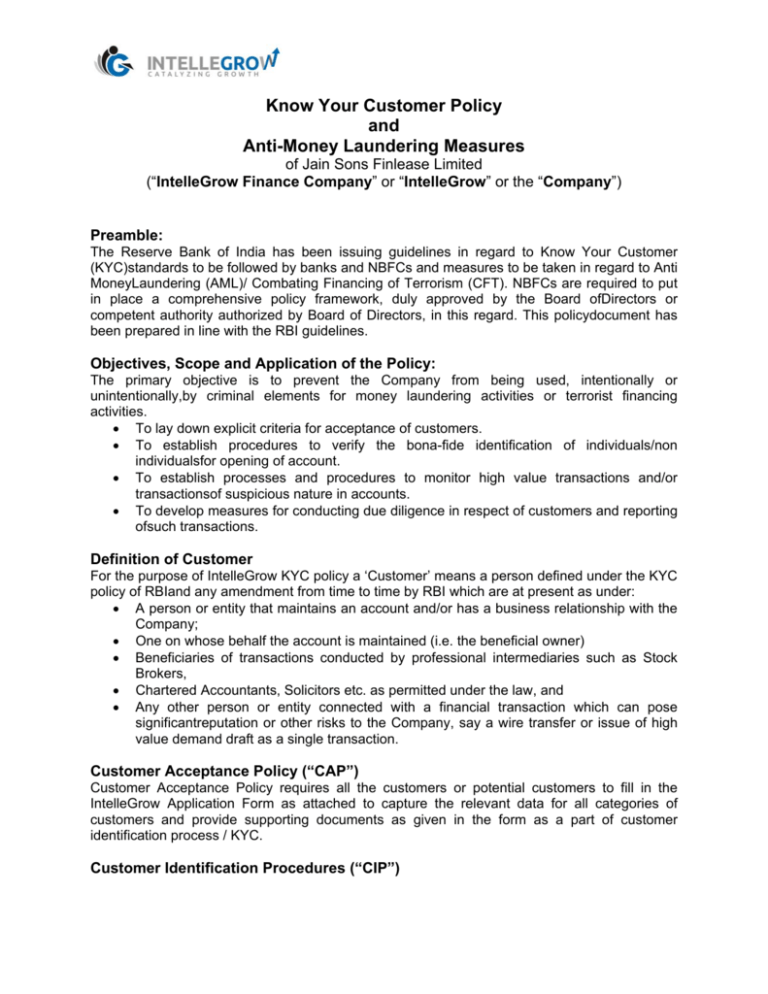
Know Your Customer Policy and Anti-Money Laundering Measures of Jain Sons Finlease Limited (“IntelleGrow Finance Company” or “IntelleGrow” or the “Company”) Preamble: The Reserve Bank of India has been issuing guidelines in regard to Know Your Customer (KYC)standards to be followed by banks and NBFCs and measures to be taken in regard to Anti MoneyLaundering (AML)/ Combating Financing of Terrorism (CFT). NBFCs are required to put in place a comprehensive policy framework, duly approved by the Board ofDirectors or competent authority authorized by Board of Directors, in this regard. This policydocument has been prepared in line with the RBI guidelines. Objectives, Scope and Application of the Policy: The primary objective is to prevent the Company from being used, intentionally or unintentionally,by criminal elements for money laundering activities or terrorist financing activities. • To lay down explicit criteria for acceptance of customers. • To establish procedures to verify the bona-fide identification of individuals/non individualsfor opening of account. • To establish processes and procedures to monitor high value transactions and/or transactionsof suspicious nature in accounts. • To develop measures for conducting due diligence in respect of customers and reporting ofsuch transactions. Definition of Customer For the purpose of IntelleGrow KYC policy a ‘Customer’ means a person defined under the KYC policy of RBIand any amendment from time to time by RBI which are at present as under: • A person or entity that maintains an account and/or has a business relationship with the Company; • One on whose behalf the account is maintained (i.e. the beneficial owner) • Beneficiaries of transactions conducted by professional intermediaries such as Stock Brokers, • Chartered Accountants, Solicitors etc. as permitted under the law, and • Any other person or entity connected with a financial transaction which can pose significantreputation or other risks to the Company, say a wire transfer or issue of high value demand draft as a single transaction. Customer Acceptance Policy (“CAP”) Customer Acceptance Policy requires all the customers or potential customers to fill in the IntelleGrow Application Form as attached to capture the relevant data for all categories of customers and provide supporting documents as given in the form as a part of customer identification process / KYC. Customer Identification Procedures (“CIP”) Customer identification means identifying the customer and verifying his/her identity by usingreliable, independent source documents, data or information. IntelleGrow shall obtain sufficient informationnecessary to verify the identity of each new customer along with brief details of its promoters andmanagement, whether regular or occasional and the purpose of the intended nature of businessrelationship. The requirement as mentioned herein may be moderated according to the riskperception;for e.g. in the case of a public specially listed company it will not be necessary to identify allthe shareholders. KYC Document requirements: A. Proof of Identity in case of Individual One Self Attested copy of any one of the following: 1. Passport* 2. Photo Pan Card 3. Voter’s ID 4. Driving License* 5. ID card issued by any central/state govt. 6. Letter issued by Unique Identification Authority ofIndia (UIDAI) containing details of name, addressand Aadhaar number B. Proof of Address in case of Individual One Self Attested copy of any one of the following: 1. Passport * 2. Telephone bill (Landline) 3. Electricity bill 4. Bank Account statement issued by a public sector bank (such statement being not older than one month from the date of application) 5. Letter issued by Unique Identification Authority ofIndia (UIDAI) containing details of name, addressand Aadhaar number C. Proof of Identity and Principal place of Business in case of non-Individuals A certified true copy of all the below documents, duly signed and stamped by a Company Secretary or a Director of the applicant company: 1. Certificate of Incorporation and Certificate of Commencement of Business (if applicable) 2. Memorandum and Articles of Association 3. PAN card 4. List of Directors 5. Latest shareholding structure 6. Resolution of the Board of Directors to open an account and identification of those who have authority to operate the account 7. Power of Attorney granted to its managers, officers or employees to transact business on its behalf 8. Copy of the telephone bill (landline) of the principal place of business *compulsory in case of non resident individuals. If any of the above documents are in any language other than English, it must be translated into English along with a certificate from translator / notary public. Important: IntelleGrow shall periodically review the risk categorization of loan assets, which shall not be less than once every 6 months. IntelleGrow will also periodically update the customer identification data (including photograph/s) after the loan account is opened. The periodicity of such updation shall not be less than once in five years in case of low risk category customers and not less than once in two years in case of high and medium risk categories. Monitoring and reporting of Transactions: Monitoring of transactions will be conducted taking into consideration the risk profile of the account. IntelleGrow shall make endeavors to understand the normal and reasonable activity of the customer so that the transactions that fall outside the regular/pattern of activity can be identified, Special attention will be paid to all complex, unusually large transactions and all unusual patterns, which have no apparent economic or visible lawful purpose. Background of the customer, country of origin, sources of funds, the type of transactions involved and other risk factors shall determine the extent of monitoring. Higher risk accounts shall besubjected to intensify monitoring. IntelleGrow shall carry out the periodic review of risk categorization oftransactions/customers and the need for applying enhanced due diligence measures at a periodicityof not less than once in six months. IntelleGrow shall explore the possibility of validating the new accounts opening application with variouswatch lists available in public domain, including RBI watch list. After due diligence, anytransactions of suspicious nature will be duly reported by principal officer to Director, FinancialIntelligence Unit- India (FIU_IND). To ensure monitoring and reporting of all transactions and sharing of information as required underthe law for KYC, the Board may nominate any Director or authorized CMD or any other officer(s) dulyauthorized by CMD to be designated as IntelleGrow’s Principal Officer with respect to KYC/ AML/ CFT. Principal Officers for KYC/ AML/ CFT: Principal Officer(s) for KYC will act independently andreport directly to the concerned Director/CMD or to the Board of Directors. The role andresponsibilities of the Principal Officer(s) should include overseeing and ensuring overallcompliance with regulatory guidelines on KYC/AML/CFT issued from time to time and obligationsunder the Prevention of Money Laundering Act, 2002, rules and regulations made there under, as amended form time to time. The collection of data on the borrower side would be the primary responsibility of Project AppraisalDepartment and the required data as per formats (IntelleGrow Application Form) prescribed in this policyshall be collected, irrespective whether IntelleGrow is the lead institution or there are other co-financinginstitutions. To ensure monitoring of the KYC Guidelines laid down by IntelleGrow, the borrowers may be requestedto resubmit their forms annually or in case there is any change in the structure of entity within15 days of information of such change. Closure of Accounts/Termination of Financing/Business Relationship: Where IntelleGrow is unable to apply appropriate KYC measures due to non furnishing of informationand/or non-operation by the customer, the Company shall terminateFinancing/Business Relationship afterissuing due notice to the customer explaining the reasons for taking such a decision. Such decisionshall be taken with the approval of Chairman & Managing Director or Principal Officer. General Information collected from the Customer shall be treated as confidential and details thereof are notto be divulged for cross selling or any other like purposes. IntelleGrow shall therefore, ensure thatinformation sought from the customer is relevant to the perceived risk, is not intrusive and is inconformity with the guidelines issued by RBI in this regard. IntelleGrow shall ensure that any remittance offunds by way of demand draft, mail/telegraphic transfer or any other mode for any amount isaffected by cheques and not against cash payment. Risk Management: All customers would be included under this policy excepting when scheduledcommercial banks and FIs are registered with statutory bodies like RBI, Government Companies orany organization owned or controlled by Government, they may be exempt from IntelleGrow’s KYC policy. Further, IntelleGrow customers will be categorized based on perceivedrisk, into three categories - A, B & C. Category C customers include low risk, Category Bcontains medium risk customers while Category A are high risk customers. None of the entitieswill be exempted from IntelleGrow’s KYC procedure, irrespective of the status and relationship with the Company or promoter/s. The above requirement may be moderated according to the risk perception. 1. High Risk – (Category A): High risk customers typically include (a) firms with sleepingpartners (b) politically exposed persons (PEPs) of foreign origin (c) non face to face tocustomers and (d) person with dubious reputation as per publicinformation available. 2. Medium Risk – (Category B): Medium risk customers will include (a) non – resident customers, (b) high net worth individuals (c) trust, charitable organizations, non govt. organization(NGO), organizations receiving donations, and companies having closed family shareholding or beneficial ownership. 3. Low Risk – (Category C): Low risk individuals (other than high net worth) and entities whose identities and sources of wealth can be easily identified and all other persons not covered under above two categories. Business Development Manager (Relationship Manager with client company) inIntelleGrow shall obtain the required data/documents and other relevant information and credit risk profiles of the existing and new customers and apply various Anti Money Launderingmeasures keeping in view the risk involved in a transaction. Risk Management Committee (“RMC”): The Principal officer may submit the periodic report to RMC if a need arises in case of high riskcases and which may require further guidance from Committee so they can assess the risk involvedin the case of different customers on the basis of data collected by the business team. Depending onthe requirement, services of an independent consultant having knowledge and background on thesubject may be taken. Such issues of categorization shall be kept confidential and shall not be divulgedto any third party irrespective of their relationship with Company at any level of organization. KYC for the Existing Accounts: While the KYC guidelines will apply to all new customers, the same would be applied to the existingcustomers on the basis of materiality and risk. However, transactions in existing customers would becontinuously monitored for any unusual pattern in the operation of the accounts. As required under the Act and rules, information so collected for existing or new customers shall be properly retained andpreserved for each customer. Profile of the customer may be prepared for quick reference as and whenrequired. The information/documents so collected shall be treated as confidential and shall not bedivulged for cross selling or for any other purpose. Employee’s Training: IntelleGrow shall have an ongoing employee training programme so that the team members are adequately trained in KYC/ AML/ CFT procedures. Training requirements shall have different focuses for frontline staff, compliance staff and officer/staff dealing with the new customers. It is crucial that all those concerned fully understand the rationale behind the KYC policies and implement them. Updation in KYC Policy of Company CMD/MD/CEO of IntelleGrow will be authorized to amend/modify the KYC/ AML/ CFT Policy or such other related guidance notes of Company, to be in line with RBI or such other statutory authority’s requirements/updates/ amendments time to time. MANDATORY DOCUMENTS REQUIRED FOR STARTING A RELATIONSHIP A. Private and Public Limited Companies 1. Certificate of Incorporation 2. Certificate of commencement of business in case of Public Ltd. Company (not required in case the company is registered prior to Companies Act 1956 or if the company has subsequently become Public Limited from Private Limited) 3. Certified True copy (certified by Company Secretary or Director) of the Memorandum and Articles of Association. 4. List of Directors (certified by Company Secretary or Director) 5. True Copy (certified by Company Secretary or director) of list of signatories. 6. Annual Report for last 3 years of the company 7. Form 60/PAN card 8. Evidence of listing in a stock exchange, if any B. Accounts, where third party mandate exists 1. True notarized copy (with attested signature of POA holder and Managing Director orhis authorized signatory) of power of Attorney (POA) Agreement. 2. Reason for granting POA. 3. True Copy (certified by Company Secretary or director) of Identity and addressdocuments of POA holder 4. Signed photograph of POA holder. 5. All other verification documents as applicable for Public/Private limited companies. C. Financial Institutions 1. True copy (certified by Company Secretary or director) of Certificate of Institution’sLicense. 2. True copy (certified by Company Secretary or director) of Certificate ofIncorporation. 3. True copy (certified by Company Secretary or director) of Statue or equivalent,stating that the institution is a regulated entity. 4. All other verification documents as applicable for Public/Private limited companies. Acceptable proof of address documents (Any one) 1. Sales Tax Registration certificate 2. Factory Registration certificate 3. Recent (not more than 3 months old) utility bill in the name of the company (Telephone Bill,Electricity Bill, Water Bill, Lease Agreement duly signed by all parties, Rental Agreementduly signed by all parties) 4. Import Export Code. 5. Any other documents issued by Government showing Address. 6. Form 18 and ROC receipt filed for recording change of registered address. 7. Form 32 and ROC receipt filed for recording change of Directors. 8. In case of difference in the addresses provided by the company and the address proof, the Business Verification report should be carried out by approved Chartered Accountant and should contain the following: a. Whether there is a signage outside the address that shows the entity’s existence at that address. b. What level of business activity is seen at the address? c. How long the entity has been in existence at that address. d. For cases, where the operating/trading address is different from the registered address, office verification will be done by Chartered Accountant, for trading address. Where the registered and trading address is same, no separate proof is required to be provided (Other than the confirmation by the Chartered Accountant/Business)
